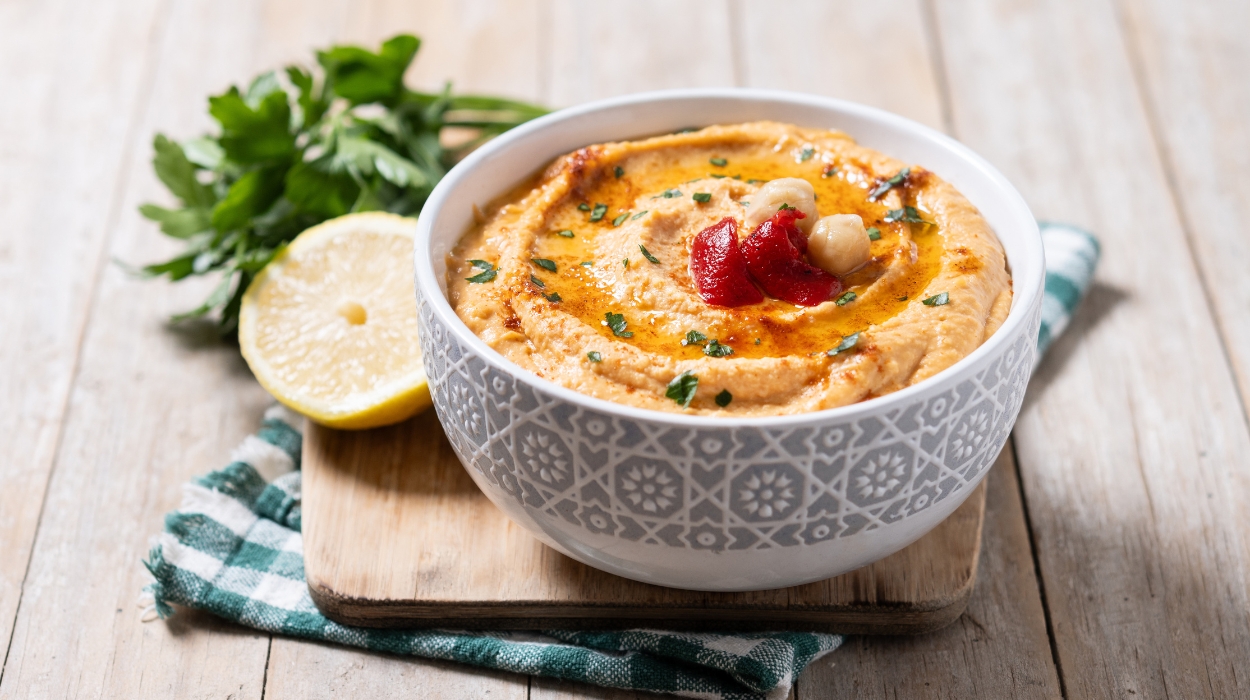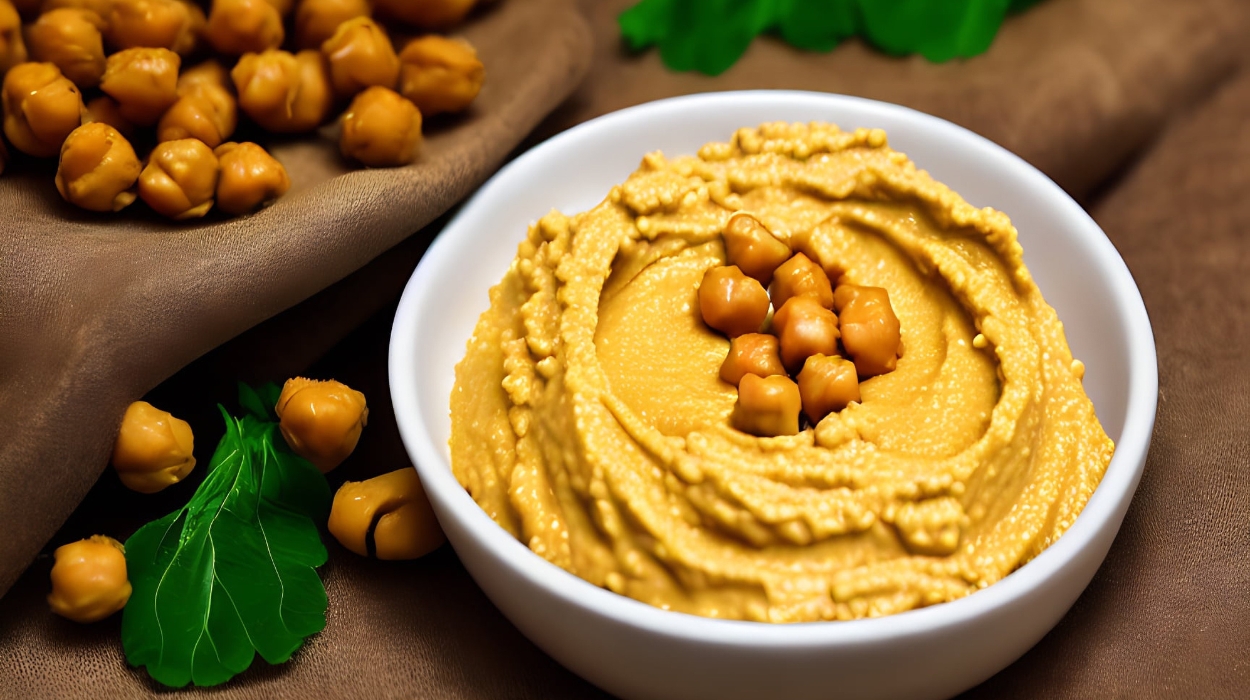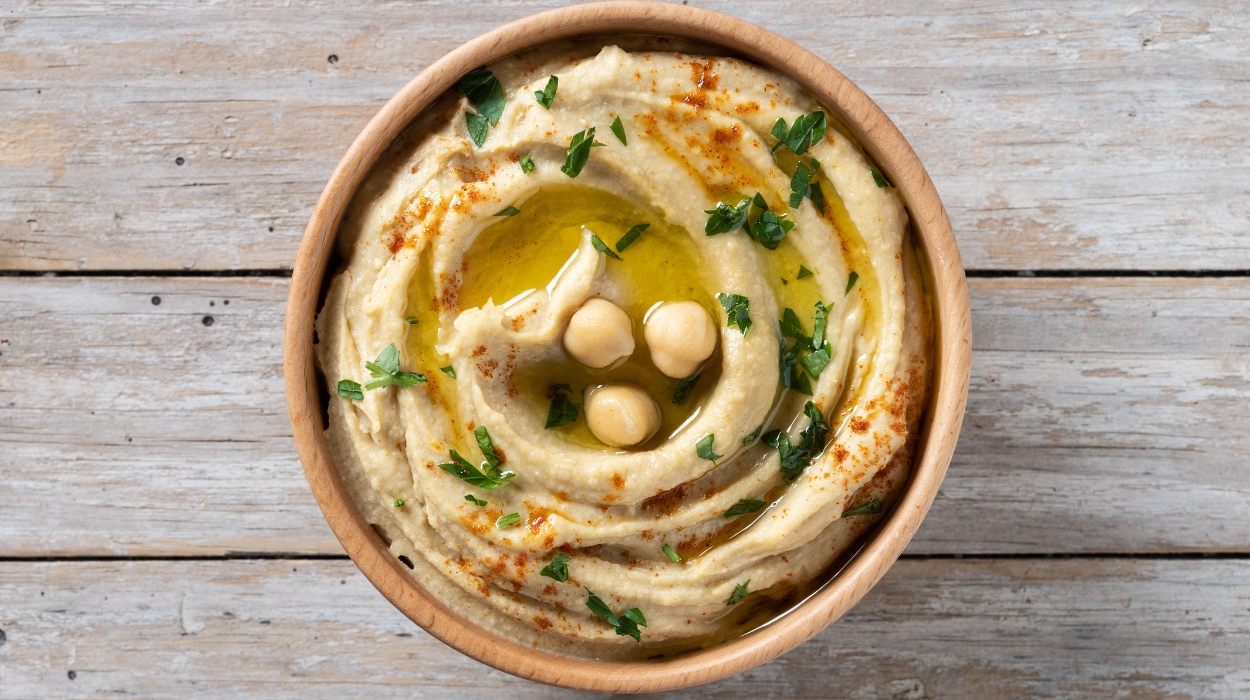 Expert's opinion
Expert's opinion
Expert's opinion
The article is a subjective view on this topic written by writers specializing in medical writing.
It may reflect on a personal journey surrounding struggles with an illness or medical condition, involve product comparisons, diet considerations, or other health-related opinions.
Although the view is entirely that of the writer, it is based on academic experiences and scientific research they have conducted; it is fact-checked by a team of degreed medical experts, and validated by sources attached to the article.
The numbers in parenthesis (1,2,3) will take you to clickable links to related scientific papers.
Is Hummus Good For You? Nutrition, Benefits & How To Eat 2024

You might’ve seen people eating a hummus snack at your latest group gathering. It’s the thick and creamy spread made from mashed chickpeas. Even though hummus has been a huge part of Middle Eastern cuisine for centuries, it is now becoming more popular[1] in the United States, with an estimated 15 million Americans consuming the dip regularly.
With all its popularity, you might be curious whether hummus is good for you. This article will explain what it is made from, whether it is good or bad for you, and how to include it in your diet.
Is Hummus Healthy?
Yes, hummus is a healthy choice, rich in anti-inflammatory properties from ingredients like chickpeas and olive oil, which can support heart health by optimizing cholesterol levels.
Why Is Hummus Good For You?
The health benefits of hummus are plentiful, as long as you make it on your own or purchase store-bought hummus made from quality ingredients free of added sugars and other artificial preservatives. The basic recipe is chickpeas — also known as garbanzo beans — high-quality olive oil, lemon juice, and tahini.
These ingredients are full of potent anti-inflammatory properties. We know that inflammation causes a variety of diseases that can be life-threatening, such as heart disease, diabetes, and cancer. Therefore, eating a healthy diet rich in anti-inflammatory properties can be very healthy.
Also, consuming foods high in healthy fats and soluble fiber — such as hummus, which contains extra virgin olive oil — is known to reduce bad cholesterol levels and increase good cholesterol levels. Optimizing cholesterol levels can help reduce your risk of cardiovascular disease, which is the number one killer of Americans.
What Is Hummus?

So what exactly is hummus? This dip has a rich history and is often called an ancient food as it has been consumed for centuries and even by significant historical figures in the Middle Eastern part of the world.
According to the ancient text, hummus has been eaten since the thirteenth century. Today we consume it in almost every part of the world. It is made by combining mashed garbanzo beans with other flavors and ingredients. Common additives to mashed chickpeas to make hummus include tahini, oil, salt, and lemon juice. You can sometimes see different versions of hummus, including garlic, roasted red peppers, and even sweeter varieties, including dates and cocoa powder.
In the Middle East, hummus is typically combined with bread at breakfast time. However, you can use it for various foods as a dip. Some people dip vegetables into the spread, while others spread it on taco shells or even dip crackers into the spread. It is very versatile and pairs well with almost any food.
Hummus Nutritional Value
The nutrition values provided by the United States Department of Agriculture
One Tablespoon of Hummus — 15 grams:
- Calories: 35 calories.
- Protein: one gram.
- Fat: two grams.
- Carbohydrates: two grams.
- Fiber: one gram.
- Calcium: seven milligrams.
- Magnesium: 11 milligrams.
The nutritional values of store-bought hummus can vary greatly depending on the brands.
Health Benefits Of Hummus

So just how good is hummus for you? Hummus has many health benefits including anti-inflammatory, disease prevention, and gut health. To read about all of these and more, continue reading.
Protein
Hummus is high in protein, given it’s full of chickpeas, an excellent plant-based protein source. Protein is known to be the most satiating macronutrient and thus helps keep you fuller longer. This means you will be less likely to give in to cravings or eat additional snacks throughout the day, which can result in weight loss or healthy weight maintenance.
Protection Against Disease
As mentioned, beans — such as the ones found in hummus — can lower bad cholesterol and increase good cholesterol. This helps to decrease high blood pressure and aid in the prevention of heart disease, generally, and atherosclerosis, specifically.
In addition, you may have heard that the American Heart Association recommends a Mediterranean diet — which is rich in hummus, fish, healthy fats, and fruits and vegetables — for the prevention of heart disease and the risk of stroke. As a result, Mediterranean nations have very low accounts of heart disease and experience better health and longevity than America.
Hummus also contains high amounts of fiber, which helps with weight maintenance due to its tendency to make you feel fuller longer. Fiber can also protect your body from colon cancer while also keeping you regular. Regular bowel movements mean regularly ridding your body of toxins and harmful bacteria.
Lastly, the fiber in hummus optimizes digestion which helps to control blood sugar levels and thus decreases a person’s risk of developing diabetes. Therefore, areas of the world that eat hummus regularly generally have lower rates of diabetes.
Anti-Inflammatory
Chronic inflammation is becoming a huge issue in society today. Chronic inflammation caused by bad diet, stress, and environmental factors can wreak havoc on your body and result[2] in:
- Chronic pain.
- Fatigue.
- Anxiety.
- Insomnia.
- Depression.
- Mood disorders.
- Constipation.
- Diarrhea.
- Weight gain.
- Chronic illnesses.
- Allergies.
- Arthritis.
- Diabetes.
- Cardiovascular disease.
Short-term inflammation is a good thing as it is our body’s way to begin healing. Inflammation is the body’s natural defense to move toxins out of the body. The stress hormone, cortisol, becomes elevated with the onset of inflammation to oppose it; however, when you constantly deal with inflammation and cortisol remains elevated, it actually increases inflammation instead of opposing it. You then may suffer one or more of the list of symptoms above.
Therefore, eating foods that help to combat inflammation is a good way to reduce your risk of developing those symptoms that are associated with chronic inflammation.
Humus is packed with anti-inflammatory foods such as extra virgin olive oil, garlic, and chickpeas. Hummus consumption is also good for skin[3] health as its anti-inflammatory properties help fight free radicals. These molecules are the end-products of metabolism and are thought to be the main driving force behind aging skin — and aging in general.
Digestive Health
As mentioned before, chickpeas are full of fiber which is especially beneficial for digestive health. Most people only get about 20% or less of the daily fiber requirements. Women need about 25 grams of fiber daily, while men need about 35 grams daily. A fourth of a cup of hummus contains about 15% of your daily fiber needs.
Microbiome
Along with lowering your risk of diabetes, heart disease, diverticulitis, and constipation, fiber can help benefit your gut microbiome. Your gut microbiome[4] is the delicate balance of good and bad bacteria within your colon. If your gut microbiome is over-run with bad bacteria, you can experience:
- Inflammatory or irritable bowel syndrome.
- Weight gain.
- Diabetes — uncontrolled blood sugar.
- Heart disease.
- Cancer.
- Fatigue.
- Digestive issues.
- Gastroesophageal reflux disease.
- Bloating and gas.
- Constipation.
- Diarrhea.
- Eczema.
- Acne.
- Depression.
- Anxiety.
However, maintaining a high-fiber diet can prevent the buildup of bad bacteria and ensure you continually have a good gut microbiome balance. This can help to alleviate chronic inflammation due to its anti-inflammatory properties.
Liver Health
Some people often wonder if hummus is good for your liver. Indeed, hummus is a great source of unsaturated fatty acids and fiber, both of which are essential to ensuring your liver is functioning at its peak performance. Specifically, the essential fatty acids found in the olive oil of hummus can help to decrease the amount of fat in your liver and thus reduce your risk of developing fatty liver disease.
Tips For Eating Hummus
The best thing about hummus is that it’s not only good for you but also delicious. There seem to be endless ways to enjoy this spread. Even though you can find hummus at most grocery stores, the healthiest way to enjoy it is by creating homemade hummus. Simply:
- Add chickpeas to a food processor or high-quality blender.
- Add in tahini, lemon juice, olive oil, and salt.
- Blend for a few minutes until smooth.
One batch of homemade hummus should take about 5 minutes to make in your food processor or blender and can last for about three to five days in an air-tight container in the refrigerator. Some people use sesame seed paste instead of tahini if they desire a more decadent hummus.
Once you have created your hummus, you can smear it on your favorite crackers, pita chips, pita bread, or tortillas instead of high-calorie spreads like dressings and mayonnaise. Or you can dip your fresh vegetables into it for a great way to include a serving of vegetables, fiber, and unsaturated fats.
Sliced peppers, carrots, and cucumbers are excellent crunchy vessels to dip into hummus. If you are feeling adventurous, add some to your chickpea tomato salad or turkey pumpkin chili. Any choice to enjoy this creamy dip will provide you with many proven health benefits.
The Takeaway
Hummus is a delicious dip full of nutrition and dietary fiber with multiple health benefits. Research proves that hummus can help fight chronic inflammation, decrease your risk of cardiovascular disease, aid in blood sugar levels, and even help achieve a quality gut microbiome.
Best of all, hummus is easy to make and tasty to add to your daily diet.
Bottom line, the multiple health benefits of hummus make it a healthy choice to add to your daily routine that can help you achieve your health goals and help you ward off many diseases.
+ 4 sources
Health Canal avoids using tertiary references. We have strict sourcing guidelines and rely on peer-reviewed studies, academic researches from medical associations and institutions. To ensure the accuracy of articles in Health Canal, you can read more about the editorial process here
- Frankenfeld, C.L. and Wallace, T.C. (2020). Dietary Patterns and Nutritional Status in Relation to Consumption of Chickpeas and Hummus in the U.S. Population. Applied sciences, [online] 10(20), pp.7341–7341. doi:https://doi.org/10.3390/app10207341.
- Pahwa, R., Goyal, A. and Ishwarlal Jialal (2023). Chronic Inflammation. [online] Nih.gov. Available at: https://www.ncbi.nlm.nih.gov/books/NBK493173/.
- Zhang, Y., Heinemann, N., Rademacher, F., Darvin, M.E., Raab, C., Keck, C.M., Vollert, H., Fluhr, J.W., Gläser, R., Harder, J. and Meinke, M.C. (2022). Skin Care Product Rich in Antioxidants and Anti-Inflammatory Natural Compounds Reduces Itching and Inflammation in the Skin of Atopic Dermatitis Patients. Antioxidants, [online] 11(6), pp.1071–1071. doi:https://doi.org/10.3390/antiox11061071.
- Berg, G., Rybakova, D., Fischer, D., Tomislav Cernava, Christine, M., Charles, T., Chen, X., Luca Cocolin, Eversole, K., Gema Herrero Corral, Kazou, M., Kinkel, L., Lange, L., Lima, N., Loy, A., Macklin, J.A., Emmanuelle Maguin, Mauchline, T., McClure, R. and Mitter, B. (2020). Microbiome definition re-visited: old concepts and new challenges. Microbiome, [online] 8(1). doi:https://doi.org/10.1186/s40168-020-00875-0.



